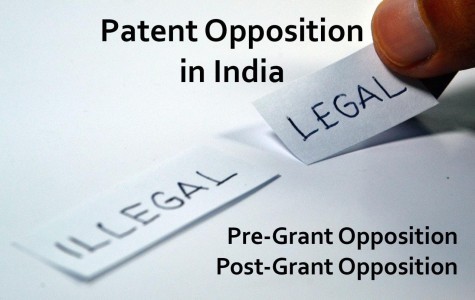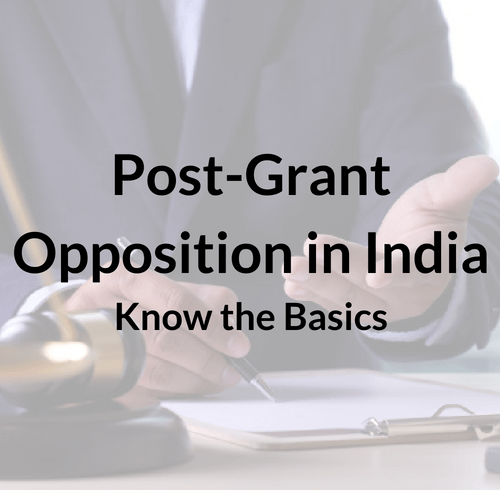Pre-grant and Post-grant Opposition of Patent Registration in Coimbatore
Patent Opposition
A patent is a right granted by the government to an inventor to exclusively make, sell his invention or product or process. Consequently, it becomes essential that the patent is granted solely to those innovations which confirm the exclusive right and abide by the patentability criteria. Proceedings of opposition are framed in order to prevent unlawful grant of patents. According to Indian Patent Act, depending upon the stage of the patent, opposition can be filed either as pre-grant or post-grant. On 1st January, 2005 (3rd amendment), India signed the Trade Related Aspects Intellectual Property Rights (TRIPS) agreement, where Section 25 of the Patent Act was amended in light of the TRIPS agreement to introduce an ‘integrated’ system of both pre-grant and post-grant opposition in India. Before the third amendment, India only provided for the pre-grant opposition. As compared to the laws of other countries, the Indian Patents (Amendment) Act, 2005 is the only Act which gives an opportunity for opposition to be filed before the grant of patent as well as after that.

Pre-grant opposition can be filed by ‘any person’ whereas post-grant opposition can be filed only by a ‘person interested’. As of Section 2 (1) (t) ‘persons interested’ as persons engaged in, or in promoting, research in the same field to which the invention relates. However, the term ‘research’ has not been defined. On one hand people are demanding that the term ‘person interested’ should be replaced with ‘any person’ allowing those stakeholders to file post-grant opposition whosoever themselves are not engaged in or in promoting the research, like patients, NGOs. But in certain instances even the NGOs representing patient’s interests have also filed post-grant opposition.
Pre-grant opposition
Pre-grant oppositions are provided under the provision of Section 25(1) of the Indian Patent Act. As per the provisions, before the grant of a patent ‘any person’ or any ‘third party’ or ‘Government’ can oppose the patent application. He has to submit the opposition to the Controller of Patents in writing along with the statement and evidence in support of the opposition.
Procedure
Pre-grant opposition can be filed to the Controller by any person, at any time after the publication of patent application under section 11A and before the grant of patent on any of the grounds mentioned in Section 25 (1). In case the pre-grant opposition is received after the grant of patent, Controller shall return the pre-grant opposition to the opponent. Under the conditions of section 11A, patent is not granted before the expiry of 6 months from the date of publication. Therefore, in order to file a pre-grant opposition the opponent should file it before the expiry of 6 months. Hence, a person may file the pre-grant opposition within the assured period. The representation shall include a statement and evidence, if any, in support of such representation and a request for hearing, if so desired. The Controller shall consider the representation only after a request for Examination for that application has been filed. The Pre-grant opposition, if available on record, is considered by the Controller along with the report of the Examiner.

On considering the opposition, if the Controller is of the opinion that the opposition does not contain any merit, an opportunity of hearing shall be granted to the opponent, if requested. After hearing the opponent, if the Controller is still of the opinion that the opposition shall be declined, a speaking order shall be issued rejecting the pre-grant opposition, ordinary within the time period of one month. However, if the controller is of the opinion that pre-grant opposition has merit and the application shall be refused or amended, he will give a notice to the applicant along with a copy of the representation. The applicant shall, if he so desires, give reply to that representation along with his statement and evidence, if any, in support of his application within three months from the date of the notice. Then all the statements and evidences filed by the applicant will be considered by the Controller. Now, the Controller may either refuse the evidence and the grant of patent or he will ask for amendment of the complete specification to his satisfaction before the grant of patent. If the application for patent is to be refused on consideration of the pre-grant opposition under section 25 (1), a specking order of refusal shall be issued under Section 15 (Section 11A,15, 25(1) and Rule 55).
Grounds of pre-grant opposition
Section 25(1) of the Indian Patents Act, 1970 (Act) and Rule 55 of the Indian Patent Rules, 2003 (Rules) provide the grounds on which a pre-grant opposition can be filed. They include,
- Any wrongful way of obtaining the whole or any part of the invention (Section 25(1)(a)).
- Prior publication (Section 25(1)(b)).
- Prior claiming (Section 25 (1) (c)).
- The invention that was publicly known or used in the country (Section 25 (1)(d)).
- The invention which is obvious and lacks inventive step (Section 25 (1) (e)).
- The subject of any claim of the complete specification which is not an invention under this Act; (Section 25(1)(f)).
- The specification which does not sufficiently and clearly describe the invention or a method by which it is to be performed. (Section 25(1)(g)).
- The condition in which an applicant fail to disclose information to the Controller as required by Section 8 or the condition in which some or all of the information furnished by the applicant as required by Section 8 was known by the applicant to be false. (Section 25 (1)(h)).
- If the applicant fail to file the application within 12 months from the date of the first application in a convention country by the Applicant or a person from whom the applicant derives title (Section 25 (1) (i)).
- The specification which does not disclose or wrongly mentions the source or geographical origin of biological material used in the invention. (Section 25 (1) (j)).
- The invention which claims traditional knowledge (Section 25(1) (k)).
Post-grant opposition
Any ‘interested person’ can file a post-grant opposition in the prescribed format, in duplicate, within 12 months from the date of publication of the grant of patent in the Indian Patent Journal. If in case the patentee wants to contest the opposition, he has to leave a reply statement (at an ‘Appropriate office’) mentioning the grounds upon which the opposition is contested and evidence (if any) in support of his case. He may give notice to the Controller in Form-7 along with the fee of Rs.6000.

‘Person interested’ includes a person engaged in, or in promoting research in the same filed as that to which the invention relates. It may be an organization that has a manufacturing or trading interest in the goods connected with the patented article or which has a financial interest in manufacturing such goods or which possesses patent registration in Coimbatore relating to the same subject.
Since the grant of patent is now only done through electronic module, the date and time of grant is available to the public on a real time basis through the official website. Consequently, any opposition filed after the date of grant of patent registration in India will be treated as a post grant opposition. However, the post-grant opposition can be filed only on the grounds as mentioned in Section 25 (2).
Procedure
- After receipt of Notice of Opposition against the Patent registration in India granted, the Controller shall send a notification to the patentee without any delay. Opponent shall send a copy of the statement and evidence, if any, to the patentee.
- According to Rule 59 if the patentee wants to contest the opposition, he shall file a reply statement setting out fully the grounds upon which the opposition is contested, and evidence if any, in support of his case within a period of 2 months from the date of receipt of the copy of opponent’s written statement and evidence, if any, and deliver a copy of the opponent.
- If the patentee does not want to contest or does not file his reply and evidence within two months, the patent shall be deemed to have been revoked and the controller shall issue the order of revocation of patent and the fact of revocation is entered in the register of patents.
- In order to examine such notice including all the documents filed under rule 57-60 in connection with opposition by the opponent as well as patentee the Controller will form an opposition board consisting of three members, one among them will be Chairman. The examiner, who was dealing with the application will not be made a member of the board. The Controller shall forward the copies of the evidences and replies (submitted under Rule 57-59) to the Opposition Board.
- By considering all the submissions submitted by the Controller, Opposition Board will conduct the examination and after examining the board shall submit the report along with reasons on each ground taken in the Notice of Opposition. Joint decision is to be taken within a time period of three months from the date on which all the documents were forwarded to them. After receiving the recommendation of the opposition Board, the Controller shall fix without undue delay, a date and time for the hearing of the opposition and inform the parties, at least ten days in advance (Rule 62 (1)). The Controller may require the members of Opposition Board to be present in the hearing. If either party intends to rely on any publication at the hearing not already mentioned in the notice of opposition, statement or evidence, he shall give to the other party and to the controller a notice of his intention to do so, together with details of such publication. Such notice shall be given at least five days before the date of hearing.
- If either the patentee or the opponent is keen to be heard, or if neither party desires to be heard, then without a hearing, and after taking into consideration the recommendation of Opposition Board, the Controller shall decide the opposition, i.e., he may revoke the patent registration in India, or order amendments in the patent or refuse the opposition and issue a speaking order.
- If the Controller orders to amend the specification, the patentee will have to submit such amended documents to the office within a reasonable time, as directed by the Controller.
- According to Rule 63 if the patentee wants to withdraw the application, then the Controller may decide whether the costs should be awarded to the opponent.
Grounds of post-grant opposition
Section 25 (2) of the Act provide the different grounds available for filing a post-grant opposition. However, the grounds of the pre-grant and post-grant opposition are same.